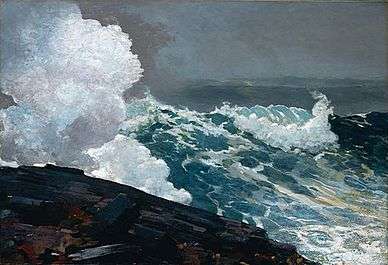Northeaster (painting)
| Northeaster | |
|---|---|
 | |
| Artist | Winslow Homer |
| Year | 1895 |
| Medium | Oil on canvas |
| Dimensions | 87.6 cm × 128 cm (34.5 in × 50 in) |
| Location | Metropolitan Museum of Art, New York City, US |
| Accession | 10.64.5 |
| Website |
www |
Northeaster is one of several paintings on marine subjects by the late-19th-century American painter Winslow Homer. Like The Fog Warning and Breezing Up, he created it during his time in Maine.[1] It is on display in the Metropolitan Museum of Art in New York. Viewers are presented a struggle of elements between the sea and the rocky shore.[2] Winslow Homer excelled in painting landscape paintings that depicted seascapes and mountain scenery. [3][4]
Background and description
After extensive travel, Homer settled in Prouts Neck, Maine. He had a studio built for him, which was completed in 1884, and painted marine subjects, including the hard lives of the fishermen and their families. He increasingly chose to depict the sea itself, and was especially attracted to stormy seas. During this period he painted a wide array of seascapes such as The Gulf Stream (1899), Moonlight – Wood's Island Light (1886), Northeaster (1895) and Early Morning After a Storm at Sea (1902). Many of his paintings depict the battlefront of the sea and the shore, and the waves crashing onto the rocky shore. It has been said that they "are among the strongest expressions in all art of the power and dangerous beauty of the sea".[5] Northeaster shows the waves while the Northeaster blows. Northeasters are storms along the upper East Coast of the United States that derive their name from the direction of the wind as it rotates onto land. The painting dates from 1895, but Homer reworked it by 1901.[6][7][8][9]
Provenance
Northeaster was at M. Knoedler and Company of New York in 1895 and then in 1895–96 with Thomas B. Clarke, also in New York. It was then returned to Homer in Maine. In 1900 it was again with Knoedler. From 1901 to 1910 it was owned by George A. Hearn, also of New York, who gave it to the Metropolitan Museum.[6]
References
- ↑ "Winslow Homer". www.encyclopedia.com. Retrieved 2014. Check date values in:
|access-date=(help) - ↑ "Northeaster (painting)". global.britannica.com. Retrieved 2014. Check date values in:
|access-date=(help) - ↑ "travel and culture". www.nytimes.com. Retrieved 2015. Check date values in:
|access-date=(help) - ↑ "Winslow Homer". spartacus-educational.com.
- ↑ Goodrich, Lloyd (1959). Winslow Homer (PDF). George Braziller, Inc.
- 1 2 "Collection - Northeaster". www.metmuseum.org. Retrieved 2014. Check date values in:
|access-date=(help) - ↑ "global.britannica.com". global.britannica.com. Retrieved 2015. Check date values in:
|access-date=(help) - ↑ "Maritime Art Event". www.legacysir.com. Retrieved 2015. Check date values in:
|access-date=(help) - ↑ "Meeting_the_New_Century". www.researchgate.net. Retrieved 2015. Check date values in:
|access-date=(help)
External links
Further reading
- Nicolai Cikovsky, Jr., Winslow Homer, Harry N. Abrams, New York, 1990, pp. 11–13, ISBN 0-8109-1193-0
- Elizabeth Johns, Winslow Homer: The Nature of Observation, University of California Press, Berkeley, 2002, p. 9, ISBN 0-520-22725-5
- Randall C. Griffin, Winslow Homer: An American Vision. Phaidon Press, New York, 2006, ISBN 0-7148-3992-2